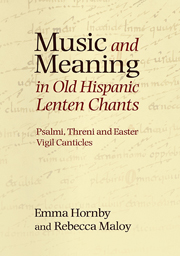Book contents
- Frontmatter
- Contents
- List of Music Examples
- List of Figures
- List of Tables
- Preface
- Abbreviations
- Manuscript Sigla
- Introduction
- CHAPTER 1 Thematic Congruity in the Old Hispanic Lenten Liturgies
- CHAPTER 2 The Threni
- CHAPTER 3 Melodic Language in the Old Hispanic Lenten Psalmi
- CHAPTER 4 Words and Music in the Psalmi
- 5 The Easter Vigil Canticles
- Afterword: Some Thoughts on the Relationship between the Old Hispanic Traditions A and B
- APPENDIX 1 A Guide to Reading Old Hispanic Notation
- APPENDIX 2 The Threni Texts
- Bibliography
- Index of Manuscripts Cited
- Index of Chants Cited
- Index of Scholars Cited
- General Index
- Studies in Medieval and Renaissance Music
CHAPTER 2 - The Threni
Published online by Cambridge University Press: 05 December 2013
- Frontmatter
- Contents
- List of Music Examples
- List of Figures
- List of Tables
- Preface
- Abbreviations
- Manuscript Sigla
- Introduction
- CHAPTER 1 Thematic Congruity in the Old Hispanic Lenten Liturgies
- CHAPTER 2 The Threni
- CHAPTER 3 Melodic Language in the Old Hispanic Lenten Psalmi
- CHAPTER 4 Words and Music in the Psalmi
- 5 The Easter Vigil Canticles
- Afterword: Some Thoughts on the Relationship between the Old Hispanic Traditions A and B
- APPENDIX 1 A Guide to Reading Old Hispanic Notation
- APPENDIX 2 The Threni Texts
- Bibliography
- Index of Manuscripts Cited
- Index of Chants Cited
- Index of Scholars Cited
- General Index
- Studies in Medieval and Renaissance Music
Summary
On certain Lenten weekdays a threnos, rather than a psalmus, is sung between the Old Testament and epistle readings in the Old Hispanic Mass. ‘Threnos’ simply means ‘lamentations’, and is familiar as the Latin title of the biblical book of that name. It is not known when the threnos was added to the Old Hispanic liturgy; there is no clear evidence that the chant in its present form existed at the time of Isidore. In his Etymologies Isidore defines the word ‘threnus’ as ‘a song of lamentation and burial’ (‘threnus, quod est lamenti carmen et funeris’). Since the chant genre preserved in later manuscripts has no connection to burial, it seems likely that he is referring more generally to a song of lamentation.
Among the Old Hispanic Lenten Mass chants, the threni are exceptional in several ways. As we showed in Chapter 1, the Lenten weekdays have very few uniquely assigned Mass proper chants in either Old Hispanic tradition; most weekday chants recur several times in the course of Lent. The threni and psalmi, however, have unique liturgical assignments, each chant being sung just once a year. Moreover, the threni are the only Lenten weekday chants that occur in the same order in traditions A and B (see Table 5).
The threni form an integral part of the theological narrative demonstrated in Chapter 1, moving from penitential themes in the first half of Lent to a Passion emphasis in the second half. Their texts are taken from the Vulgate versions of Lamentations, Jeremiah, Job, and a single citation of Isaiah. These texts contain many recurring themes and verbal phrases, which encourages us to view them as a cycle. This chapter begins with an introduction to the threni texts. We then consider the connections between those texts, the wider Old Hispanic liturgy, and the theological tradition with which the compilers would have been familiar.
- Type
- Chapter
- Information
- Music and Meaning in Old Hispanic Lenten ChantsPsalmi, Threni and the Easter Vigil Canticles, pp. 75 - 106Publisher: Boydell & BrewerPrint publication year: 2013

